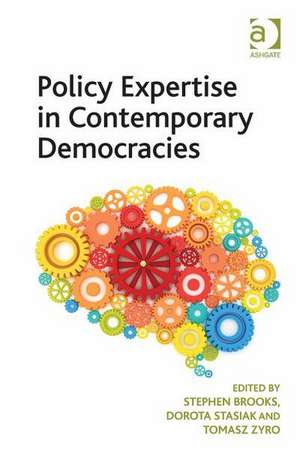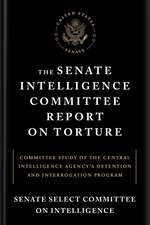Policy Expertise in Contemporary Democracies
Autor Stephen Brooks, Dorota Stasiaken Limba Engleză Hardback – 7 ian 2013
Preț: 674.03 lei
Preț vechi: 792.97 lei
-15% Nou
Puncte Express: 1011
Preț estimativ în valută:
128.99€ • 140.07$ • 108.35£
128.99€ • 140.07$ • 108.35£
Carte tipărită la comandă
Livrare economică 23 aprilie-07 mai
Preluare comenzi: 021 569.72.76
Specificații
ISBN-13: 9781409452508
ISBN-10: 1409452506
Pagini: 232
Ilustrații: Includes 7 figures and 2 tables
Dimensiuni: 156 x 234 x 14 mm
Greutate: 0.57 kg
Ediția:New ed.
Editura: Taylor & Francis
Colecția Routledge
Locul publicării:Oxford, United Kingdom
ISBN-10: 1409452506
Pagini: 232
Ilustrații: Includes 7 figures and 2 tables
Dimensiuni: 156 x 234 x 14 mm
Greutate: 0.57 kg
Ediția:New ed.
Editura: Taylor & Francis
Colecția Routledge
Locul publicării:Oxford, United Kingdom
Recenzii
’Purveyors of policy advice, such as think tanks, are now being accorded the scholarly attention which has long been their due. Written from a variety of perspectives by a multinational cast of experts, this timely volume combines theoretical guidance with practical case-studies. Consolidating existing knowledge while suggesting topics for future research, it will be invaluable for all students of an increasingly-globalised policy-making process.’ Mark Garnett, Lancaster University, UK ’This book demonstrates that scholarship on the role of think tanks in policymaking is maturing beyond inventories and anecdotes toward richer theoretical perspectives and cross-national comparative analysis. Those who study think tanks or work in them - from researchers to student interns - will benefit from the many insights these authors provide.’ Christopher Sands, Hudson Institute, United States 'This book comes as a timely contribution in an age where experts’ credibility is often contested (but demanded) and elites are seen as ever more detached from the consequences of their actions. At the same time, politics becomes increasingly a matter of ’packaging’, thus fostering worrying tendencies for any informed public debate. It expounds and explores many of the deadlocks that plague modern policymaking... This volume, nonetheless, should be of particular interest to students, political scientist, policy experts and anybody attentive to the convoluted and rapidly changing relationship between political and epistemic authority. As Brooks reminds us, only in the 1970s technocracy was still considered an ideal. How quickly things change!' LSE Review of Books 'Policy Expertise in Contemporary Democracies is a compilation of profound essays on theoretical perspectives enriched by a number of national in-depth case studies and comparisons on policy expertise useful particularly for (post-)graduates, academic experts from multiple disciplinary backgrounds such as politic
Notă biografică
Stephen Brooks is Professor at the University of Windsor and Director of the Ottawa Internship Program at the University of Michigan.
Cuprins
Introduction; Part I Theoretical Issues; Chapter 1 Theoretical Models and Approaches to Understanding the Role of Lobbies and Think Tanks in US Foreign Policy, Donald E.Abelson; Chapter 2 The Political Expert, Tomasz?yro; Chapter 3 Can the Philosopher Be a Political Expert?, MaciejSadowski; Chapter 4 Deliberating Experts Versus Political Representation, WinfriedThaa; Chapter 5 Speaking Truth to Power, StephenBrooks; Part II National Cases; Chapter 6 Do Policy Experts Matter? Lessons from Canada and the United States, Donald E.Abelson; Chapter 7 The Canadian Think Tank Scene, JaniceMackinnon; Chapter 8 Expert Policy Advice in Germany, Martin W.Thunert; Chapter 9 Determinants of German Think Tanks’ Public Policy Roles, JosefBraml; Chapter 10 Political Expertise in Poland in the Field of Foreign Policy and the Emergence of Think Tanks, JacekCzaputowicz, DorotaStasiak;
Descriere
The contributors to this insightful and original volume argue that across the western world in general, the political expert occupies as important a role today as at any time in the past. The ubiquity of information and the fact that the experts and the organizations to which they are affiliated may be viewed as having an ideological agenda has not diminished their role, influence or status. Governments and the media still rely on them for information and advice whilst organizations in civil society need them in order to provide the evidence, arguments and policy recommendations that are essential to having a voice in the public conversation.








